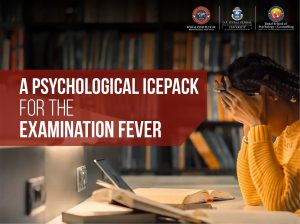Make the most of your Psychology degree at Jindal School of Psychology & Counselling with intensive training in research at the numerous labs, research centres & institutes.
Every year around World Mental Health Day (10th October), people are reminded to check in on their “happy friends” through a popular social media meme. It highlights the battle with depression and mental health issues faced by notable contemporary public figures including actors Robin Williams and Brittany Murphy. Coming from a time when sensitive matters of mental health were not openly discussed, normalising the dialogue around mental health is undoubtedly vital. But if things are to change, we need to go beyond the fleeting reminders and cursory conversations to grow the recourses and capacity needed to deal with mental health issues at a broader, formalised scale.
Indeed, the stigma around mental health is slowly cracking – albeit slower in more conservative societies like India – to reveal the realities faced not just by those affected by extreme psychological disorders, but by ordinary people in their day-to-day lives. Yet for real and enduring transformation of psychological wellbeing, it needs to be overcome as much by the masses as by professionals who are well-trained, highly-skilled, and passionate to make a difference in the field of psychology and counselling. Because beyond the common answers to concerns of the human mind, actions and behaviour that paint an incomplete – and possibly inaccurate – picture, only a deeper search can provide more concreate and comprehensive perspectives. The bottom line – there is growing need to understand human psychology and mental health through research and teaching.
Finding answers with a new, research-intensive psychology programme
In 2020, O.P. Jindal Global University (JGU) established the Jindal School of Psychology and Counselling (JSPC) with the aim to bridge the gap in mental healthcare in India, inspire more young students to pursue the study of psychology, and create an enriched academic space that can contribute meaningfully to research and growth in the field.
Whichever track of careers in psychology one might choose to pursue, research and the scientific method are mainstays. While some professionals rely on research on existing knowledge to conduct their roles, others focus on generating new knowledge that can be of value to the field’s development. This flow of knowledge is a continuous process, and no matter which side one builds a career, research remains central.
“JSPC was created to make an impact on teaching and research in the broader field of psychology and behavioural sciences. Our aim is to establish world-class laboratories for diagnostic assessment systems. We want to be more pragmatic, and we wish to provide students a hands-on experience and give them a global exposure,” shared Professor (Dr.) Sanjeev P. Sahni, Principal Director, Jindal Institute of Behavioural Sciences (JIBS), at the launch of JSPC.
JIBS will serve as a multifaceted support and resource centre for students who enrol for the B.A. (Hons.) in Psychology programme at JSPC. The three-year undergraduate programme is committed to the study of human mental processes and behaviour. According to Professor (Dr.) Derick Lindquist, Vice Dean, JSPC, the school has been established with the vision of developing a new generation of thought leaders in the highly diverse fields of psychology and counselling. “Students of the B.A. (Hons.) in Psychology programme will be encouraged to select from a large number of customisable set of courses based on their specific interests,” shares Prof. Lindquist. From an introduction to the vast world of psychology to clinical psychology and forensic psychology, students can delve deeper into varied subjects of their choice.
Research focus for experiential and goal-based learning
Talking about the salient features of the learning experience of the B.A. (Hons.) in Psychology programme, Prof. Lindquist, says, “Students will be taught valuable and critical creative thinking. They will be trained in experimental design, execution, and analysis, and will learn assessment and treatment procedures for counselling and other types of mental healthcare.” Students will be trained by faculty members who are actively engaged in research work. They will employ experiential and goal-driven learning strategies based on a course curriculum informed by the latest theories and data related to different aspects of psychology. Outside the classroom, every student will be mentored by a faculty member who will offer guidance in research work. This one-on-one interaction throughout the programme gives each student the space, freedom and guidance to truly and thoroughly delve into their areas of interest.
Adding to the comprehensive academic setting, students can make the most of equipment, tools, and software for psychological assessment and analysis at JSPC’s Experiential Research Laboratory. This centre, built in conjunction with JIBS, will offer students first-hand experience with research design and experimentation. JSPC has also set up ‘E-Cog: Emotion and Cognition Psychology Research Centre’ in collaboration with Jindal School of Liberal Arts & Humanities. Through its research projects, the centre will explore processes of emotion and cognition, and their independent functioning and interaction. These various labs and research centres inspire active involvement in research as an integral part of the college experience. Driving home the importance of research in the formative years of future mental health professionals is perhaps one of the most invaluable features of a good psychology degree.
In fact, the final year of the B.A. (Hons.) in Psychology programme will focus entirely on a research paper/Honour’s thesis undertaken by students. They will conduct extensive research on electives chosen from JSPC and other schools in JGU in the previous years. Over 100 electives from 10 schools form the basis of experiential learning and hands-on exposure. In addition to the research projects, students will undergo domestic/international internships that will offer them real-life work experience with a wide range of institutions, organisations, and NGOs focused on mental health. JGU’s international academic collaborations also bring short-term study abroad and student exchange opportunities that make students aware of the best global practices in the field.
JIBS Research Centres serve as a comprehensive resource for students
Students of the B.A. (Hons.) in Psychology programme at JSPC can benefit from JGU’s research-based institute, Jindal Institute of Behavioural Sciences (JIBS). As a member of The Academic Council on the United Nations System, the institute is driven by research and innovation in understanding human behaviour. JIBS works with top local and international researchers who bring their multidisciplinary perspectives to address issues in human behaviour. Through its four research centres, JIBS conducts studies that are of social-psychological, bio-psychological, and legal-psychological significance. So far, JIBS has been responsible for 14 book publications, 35 book chapters, and 32 articles in prestigious journals. Students have the rare opportunity to work alongside renowned academicians and practitioners and contribute towards such publications – an achievement that is highly regarded amongst the academic and professional circles akin.
JIBS also has two state-of-the-art laboratories – the Brain Behaviour Laboratory and the Forensic Science Laboratory – that offer support for high-quality and high-relevance research. The institute’s research portfolio so far includes 9 completed and 10 ongoing projects. In addition to research and publication, JIBS has organised teacher training programmes, national and international conferences, workshops, and talks with experts around the world. Initiatives led by the four research centres form a vibrant and engaging ecosystem that bring out cutting-edge learning opportunities for students:
Centre for Victimology and Psychological Studies (CVPS)
The research centre is dedicated to studies related to various aspects of victim and offender psychology. Its aim is to produce research for holistic rehabilitation of victims. CVPS works with NGOs in raising awareness and offering training in different areas of study. Students of the B.A. (Hons.) in Psychology programme can get valuable exposure to real-life scenarios and undertake research projects here.
Centre for Leadership and Change (CLC)
A good leader is someone who fosters an environment that helps to produce more leaders. The CLC works towards empowering future leaders to have a transformative effect on our society. Through leadership summits and interactive sessions, participants get sensitised to sustainable growth models. Various case studies and research projects offer the perfect platform for the leadership goals of students of the programme.
Centre for Community Mental Health (CCMH)
CCMH has signed an MoU with Melbourne Medical School, University of Melbourne, for academic and research projects focused on preventive measures for positive mental health. The centre offers an excellent avenue for students of the B.A. (Hons.) in Psychology programme as it strives to create a workforce that can offer the best possible services in government bodies, educational institutions, policy development institutes, and healthcare organisations.
Centre for Criminology and Forensic Studies (CCFS)
The centre was founded with the goal of making forensic science and criminology an integral part of legal education and practice. It focuses on interdisciplinarity and promotes knowledge sharing in the fields of law, forensic science, criminology, and criminal psychology. As CCFS takes on work that identifies the gaps between theory and practice to influence future policies and legislation, it offers students the platform to get hands-on experience in the allied fields.
Armed with a nuanced understanding of the field coupled with hands-on experience, students of the B.A. (Hons.) in Psychology programme at JSPC can opt for careers in education, counselling, social work, research, and healthcare, as well as in the wider industry as behavioural analysts managing human resources. But, above all, sensitised to the challenges in mental health landscape in the country, they will be groomed to be change-makers who can contribute to the growing scope of the field of psychology.


